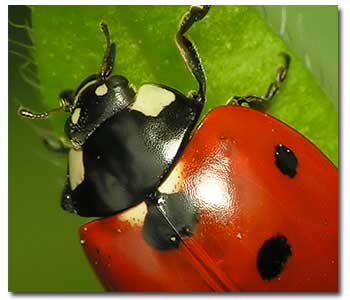Ladybug, Ladybug

DON’T FLY AWAY!
An important beneficial insect to get to know is the ladybug or, more properly, “lady beetle.” We’ll talk about two here: the vedalia beetle (Rodolia cardinalis) and the convergent lady beetle (Hippodamia convergens). Vedalia lady beetles eat aphids, scales, and other soft bodied insects. Most people are familiar with the adult, which is round, red with black spots, and about 1/4 inch long. This beetle was brought to the US from Australia in 1888 and saved the citrus industry in California by controlling cottony cushion scale. It is well-established in Florida now, as well. In addition to scale, the adult and larva have an appetite for aphids–a common rose pest. The larvae look like little dragons or alligators. Their long narrow bodies–about 1/3 inch long–are reddish-gray.
Convergent lady beetles are a native species and far more common. These are the ones most Americans think of when the word “ladybug” is used. They, and their larvae, also have an appetite for aphids and other pests. Nearly everyone can recognize ladybugs, but perhaps not so many could identify their larvae. While the adults are almost universally regarded as harmless, their small, armadillo-like, blue and orange larvae are likely to be treated with more suspicion, and are often destroyed “to be on the safe side.”
Both adults and, more particularly, larvae feed on large numbers of insect pests, especially aphids. A single larva can consume up to 500 aphids in its three-week life. Before emerging as an adult ladybug, the larva pupates, and the yellow pupa may be mistaken for a Colorado beetle, which it superficially resembles. Ladybugs are most commonly red with either two or seven black spots, but they may also be black with red spots, yellow with black spots and black with yellow spots.
Get to know your beneficial insects. They can be very useful in keeping the pests away and reducing the use of chemicals. And remember–when you do need to use chemicals in your garden, read the instructions carefully and consult with one of our garden professionals, who can advise you on the best one to use for your particular problem











